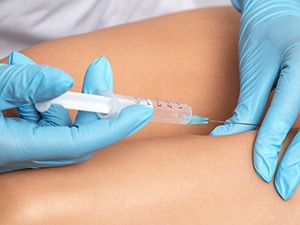New Atezolizumab Formulation for Subcutaneous Injection
The FDA approved atezolizumab and hyaluronidase-tqjs for all adult indications of intravenous atezolizumab.
The U.S. Food and Drug Administration (FDA) has approved atezolizumab and hyaluronidase-tqjs (Tecentriq Hybreza) as a subcutaneous injection to be offered in place of intravenous atezolizumab (Tecentriq) for all adult indications for which intravenous atezolizumab is approved.

Atezolizumab is an immunotherapy called an immune checkpoint inhibitor, which blocks the immune system’s natural “brakes” to help immune cells fight cancer. Hyaluronidase-tqjs is an enzyme that breaks down hyaluronan, part of the framework around some cells, including skin cells, that supports and protects them. Administering hyaluronidase-tqjs with atezolizumab allows the combination to be given subcutaneously (under the skin) instead of as an intravenous infusion, because the hyaluronidase-tqjs helps atezolizumab disperse better into the bloodstream.
This approval allows atezolizumab and hyaluronidase to be used for all approved adult indications of intravenous atezolizumab, including some lung cancers, melanomas, soft tissue sarcomas, and liver cancers. The full FDA approval history for intravenous atezolizumab is available online.
The current approval was based on results from the open-label, multicenter, international, randomized phase III IMscin001 clinical trial. Researchers enrolled 371 patients with locally advanced or metastatic non-small cell lung cancer who had not previously been treated with cancer immunotherapy and whose tumors progressed after treatment with platinum-based chemotherapy. Patients were randomly assigned (2:1) to receive subcutaneous atezolizumab and hyaluronidase-tqjs or intravenous atezolizumab.
After a single dose, the average serum atezolizumab concentration was 89 µg/mL among patients in the subcutaneous atezolizumab and hyaluronidase-tqjs arm and 85 µg/mL among patients in the intravenous atezolizumab arm, showing that patients were exposed to similar amounts of drug regardless of formulation. Patients also had similar response rates: 9% in the subcutaneous arm and 8% in the intravenous arm.
The recommended dose is 1,875 mg of atezolizumab plus 30,000 units of hyaluronidase in a 15 mL subcutaneous injection given every three weeks.
According to the prescribing information, the subcutaneous injection around seven minutes, compared to 30 to 60 minutes for an intravenous infusion of atezolizumab. Preliminary results from IMscin002, a follow-up trial to IMscin001, showed that 70.7% of patients preferred subcutaneous atezolizumab and hyaluronidase-tqjs to intravenous atezolizumab.
The FDA rendered its decision on September 12, 2024.
